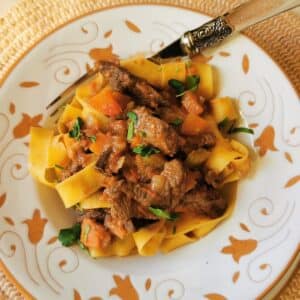[ad_1]
This venison ragu with pappardelle is an extremely flavorful traditional recipe here in Italy. It pairs wonderful game flavors with a slightly spiced and rich sauce together with egg pasta ribbons.
This sumptuous meal is excellent for cooking in large batches and will leave your guests and family thoroughly impressed.
History
This particular pasta with venison ragu recipe comes from Trentino-Alto Adige, the North Eastern Italian region which borders Austria and Switzerland and stretches across the Dolomite Alps. Food in Trentino-Alto Adige is a mixture of Austrian and Italian and, of course, game is an important part of the regional cuisine.
Traditionally, the most popular pasta served with game ragu is flat ribbons such pappardelle, tagliatelle or fettuccine.
Most pasta with venison ragu recipes also include spices and herbs such as juniper berries, cinnamon and cloves and, sometimes, sage, rosemary and thyme. In this recipe, I used bay leaves, cloves, cinnamon and juniper berries. If you can’t find juniper berries you can replace them by adding a bit of gin or rosemary.
Venison requires slow cooking, so this isn’t a dish you can make quickly. The venison needs to be marinated in wine for up to 3 hours (this gives the meat a slightly less gamey taste) and some recipes I found called for up to 6 hours of cooking!!
I simmered the sauce for 3 hours. A lot depends on the size of the pieces of venison. You can also mince it to shorten cooking times.
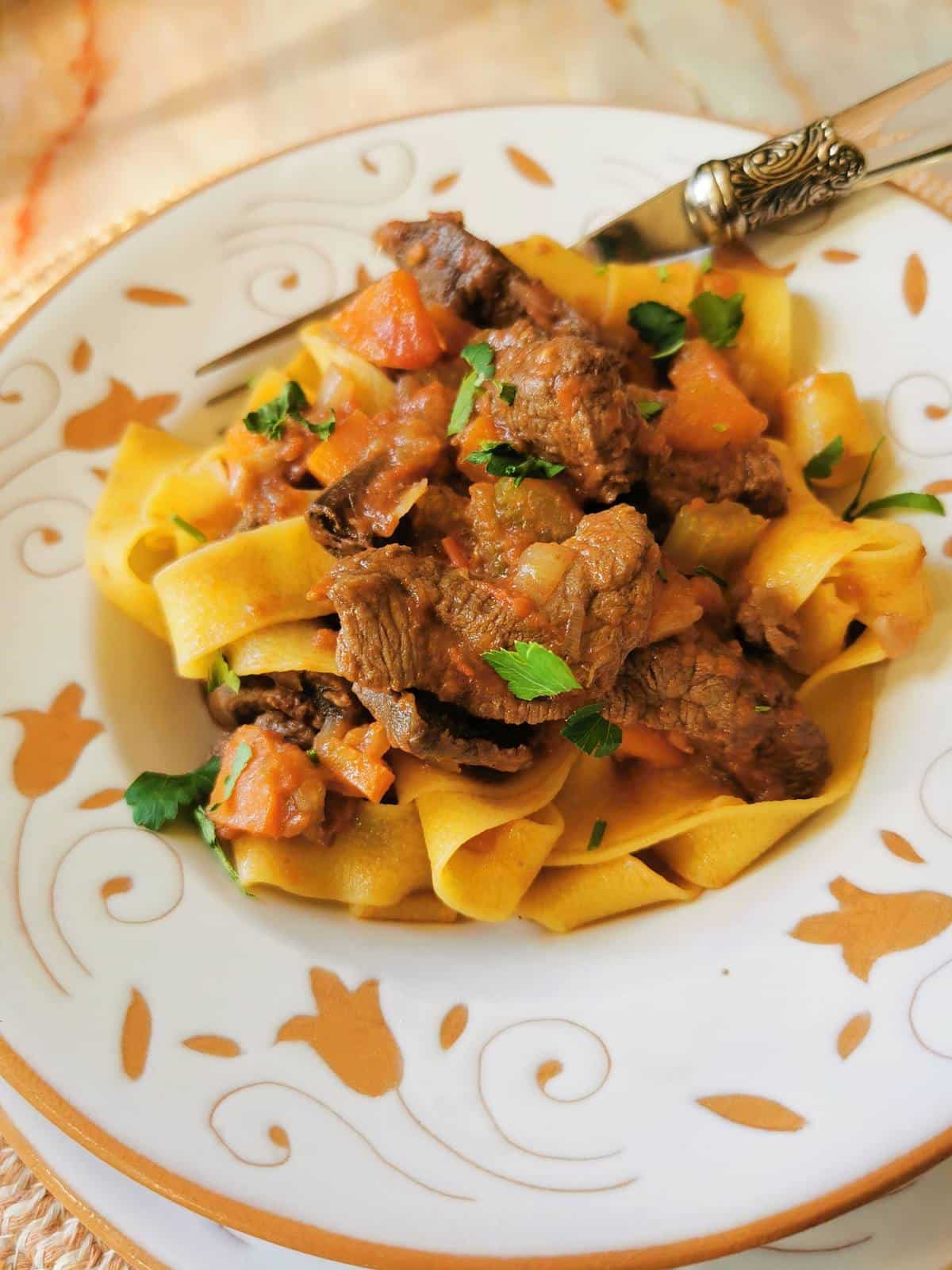

Game meat is popular in Italy!
I know that many people are against hunting wild animals for food. Personally I’m not. I’m against trophy hunting or hunting animals in danger of extinction. In Italy, there are large populations of certain game animals which, unfortunately, also cause damage to crops and agricultural land. So, the government permits hunting them.
Also, game meat is certainly much healthier than most of the meat we buy and the animals themselves have a better quality of life than most the pigs, cows and chickens we eat.
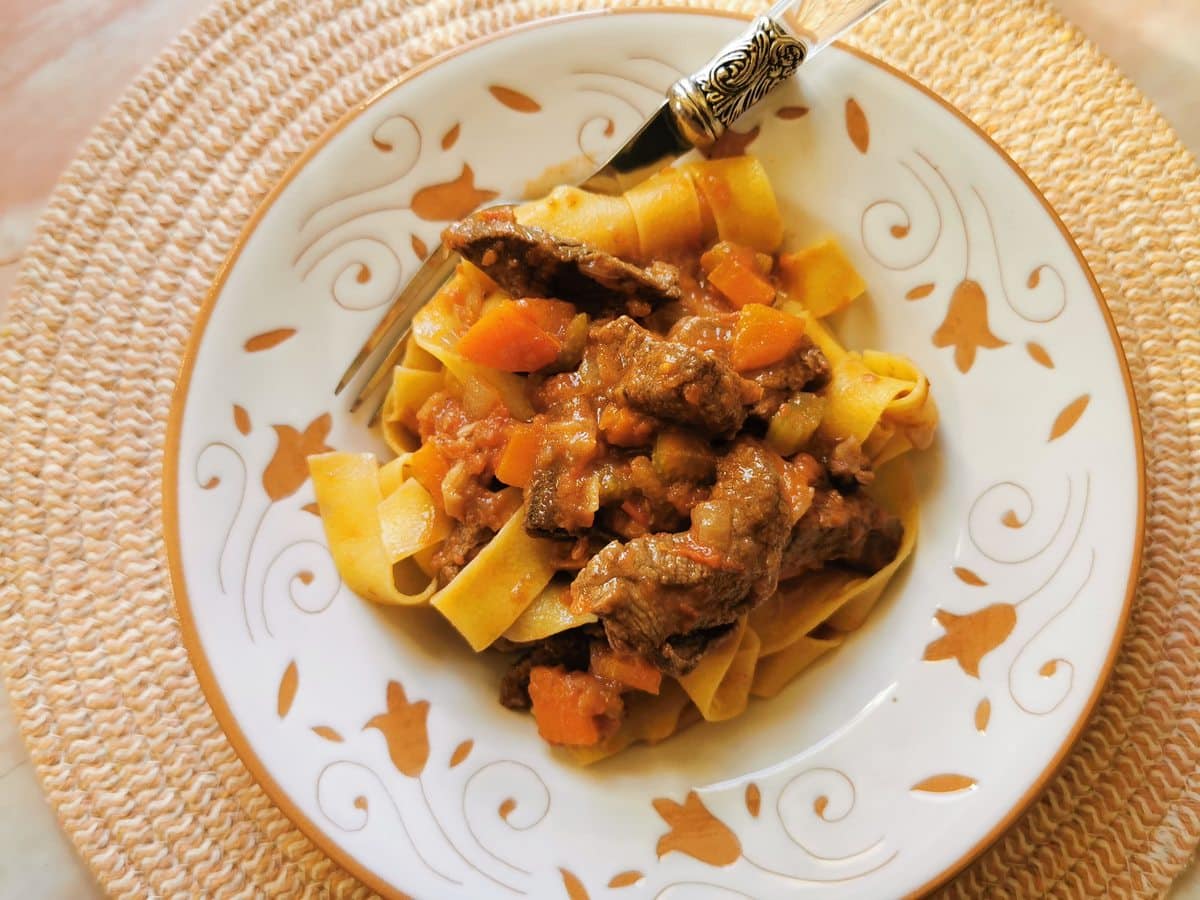

Before moving to Italy, I hadn’t eaten much game. But here, it’s very popular, especially in the mountainous areas. Game is traditionally eaten during the hunting season, which mainly runs through the winter.
By game, I mean mostly venison (cervo), roe deer (capriolo) wild boar (cinghiale) and hare (lepre). Italians eat game served in different ways including with pasta, braised as a main course or as salami. All are delicious, but I think with pasta is my favorite!
Ingredients
Venison: Look for high-quality venison from specialty butchers or online suppliers. Venison shoulder is a great choice for its flavor and tenderness once slow-cooked.
Pappardelle Pasta: Ideal for its ability to hold the rich ragu. Tagliatelle or fettuccine makes a great alternative, offering similar texture and sauce-carrying capacity.
Dry White Wine: For marinating the venison and to balance the game flavor.
Red Wine: Adds depth and richness to the sauce. A dry variety complements the gamey taste of venison.
Water or Game Stock: Use game or beef stock for a richer flavor or water for a simpler ragu.
Tomato Passata: Sometimes passata is called sieved tomatoes or tomato puree, it helps give a smooth, rich sauce. Fresh, peeled ripe tomatoes can be used as a lovely alternative when in season.
Onion, Carrots, Celery Stalks: These vegetables form the soffritto, adding sweetness and depth to the ragu.
Garlic Clove: Adds aromatic depth; browned then removed to subtlety flavor the oil.
Cloves, Cinnamon Stick, Bay Leaves, Juniper Berries: A blend of spices that adds warmth and a hint of spice, complementing the venison.
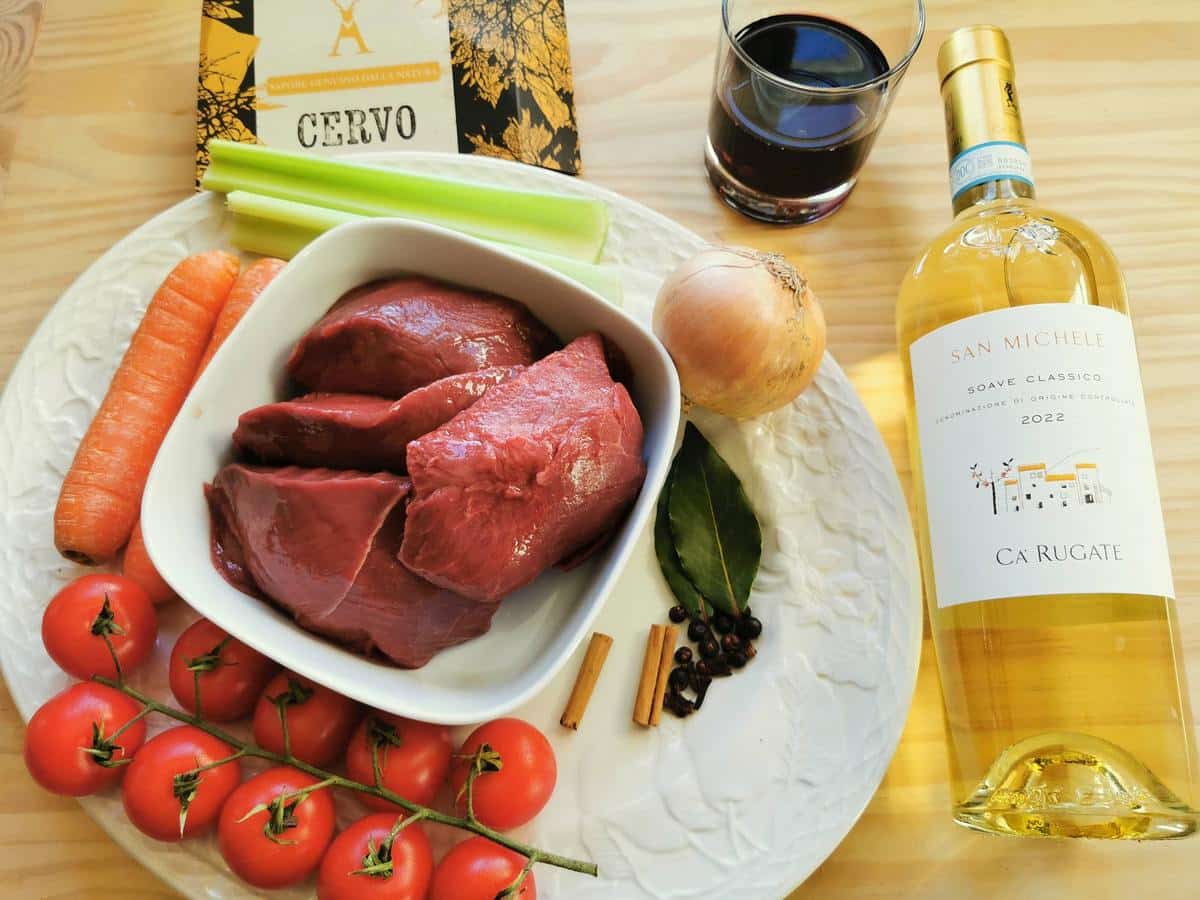

Expert Tips
Selecting the Right Cut of Venison: For venison ragu, shoulder cuts are an excellent choice for their rich flavor and texture for slow cooking. If venison shoulder is not available, other cuts, such as the leg or neck, are also good choices. For those who can’t easily find venison, beef can be used instead although the taste will be slightly different as venison does have a more gamey taste.
Soffritto Preparation Shortcut: To make the preparation of your soffritto as easy as possible, you can use a food processor with a dicing kit. This will quickly dice your onions, carrots and celery, saving you some preparation time.
Browning the Venison: To get the maximum amount of flavor from your venison ragu, it’s important to brown the venison before adding the red wine. A good technique is to push the soffritto to the sides of the pot using a wooden spoon and add the venison in the center. This ensures the meat has direct contact with the bottom of the pot, giving you a stronger sear and adding more flavor to your ragu.
Step by Step Instructions
1) Place the venison chunks in a large bowl with the dry white wine. Allow to marinate for 2-3 hours in the fridge.
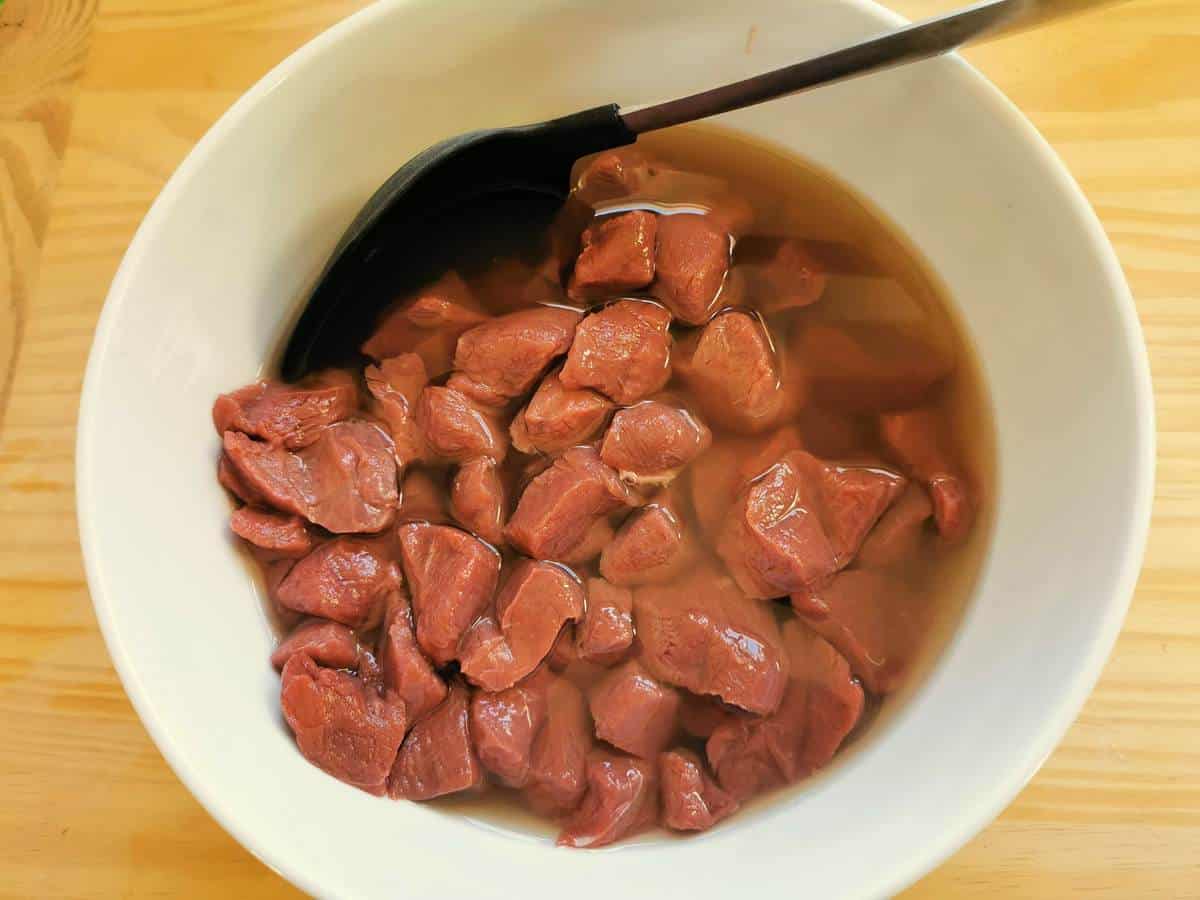

2) In a deep frying pan or Dutch oven, heat the extra virgin olive oil over medium heat. Fry the garlic clove until it starts to brown slightly, then remove and discard the garlic. Add the chopped onion, carrots, and celery to the pan, cooking until they start to soften.
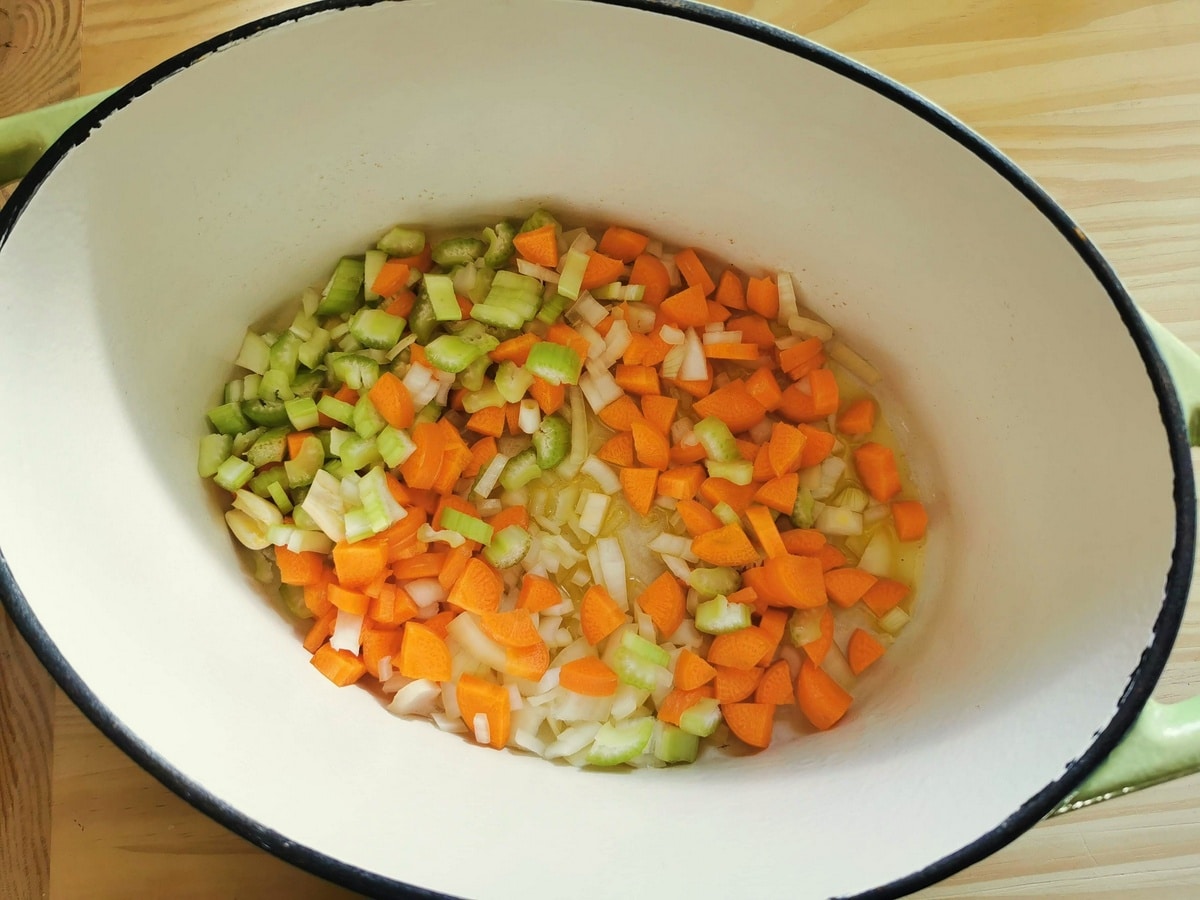

3) Remove the venison from the marinade (discard the wine) and add to the pan with vegetables. Cook for a few minutes until the meat browns on all sides.
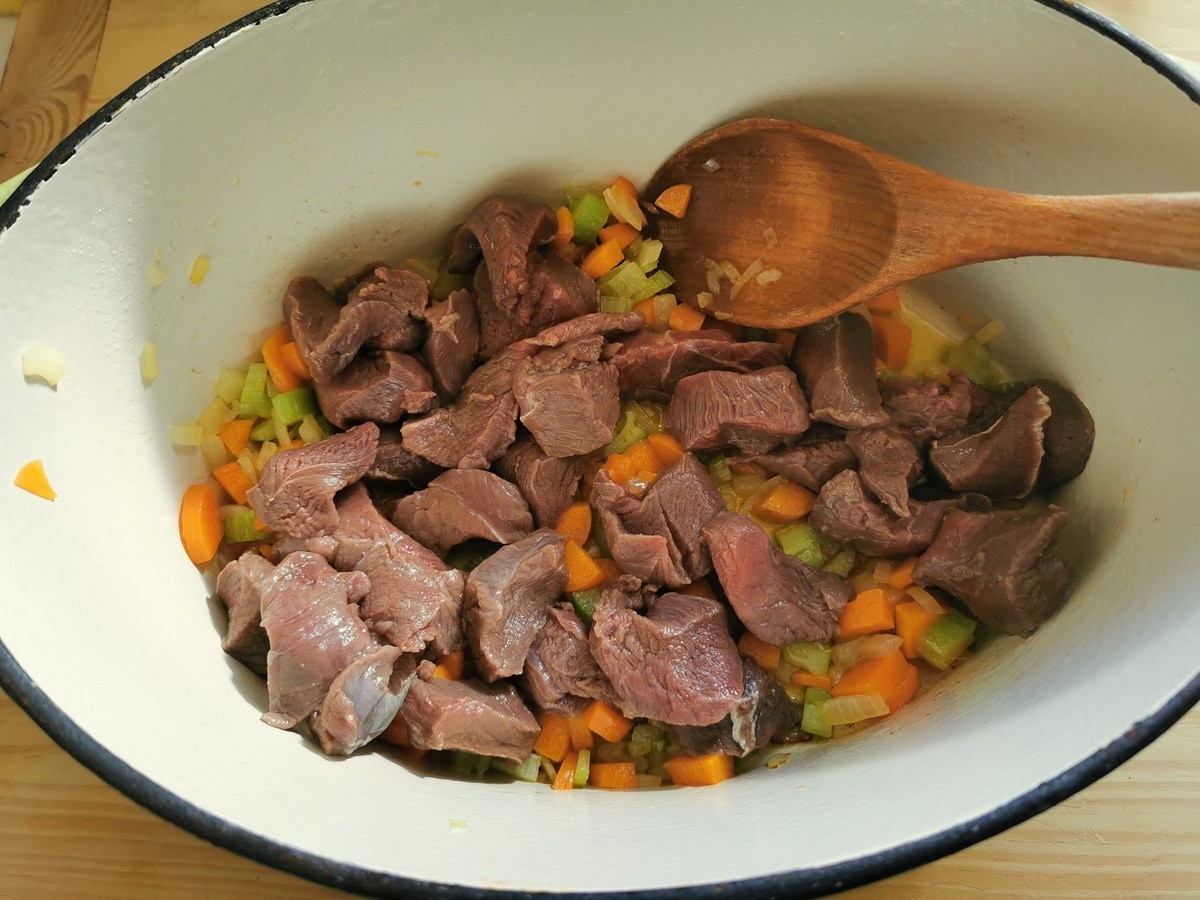

4) Increase the heat and add the red wine, allowing the alcohol to evaporate slightly. Add the juniper berries, cinnamon stick, cloves, black pepper, bay leaves, and tomato passata.
Tip: You can also put these herbs and spices into a herb sachet and place it in the pan to remove when the sauce is ready. (I didn’t use a sachet or try to remove the spices).
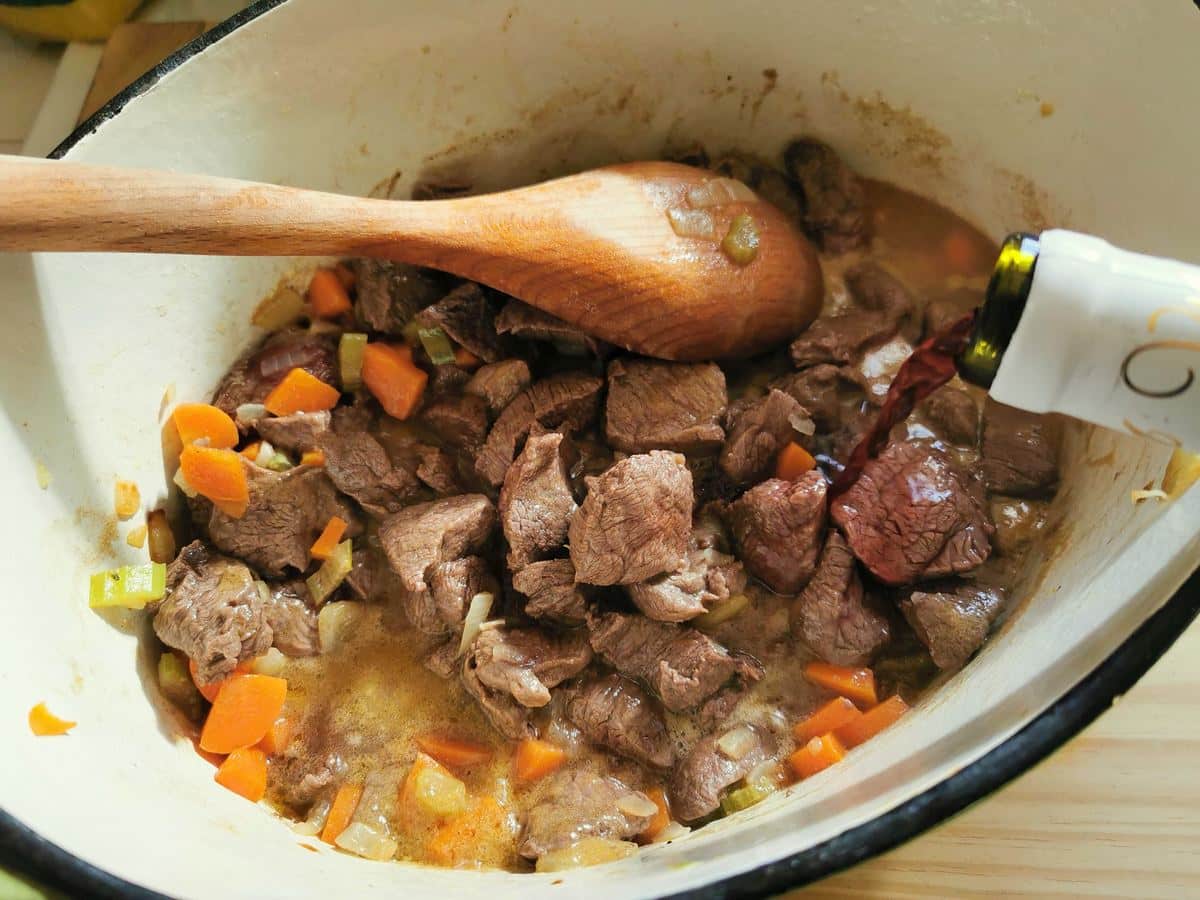

5) Cover and simmer on very low heat for about 3 hours, adding water, beef or game stock if the sauce gets too thick. Season with salt as needed.
6) When the ragu is nearly done, bring a large pot of water to a boil. Add salt, then bring to a boil again and cook the pasta al dente according to package instructions. Reserve a cup of pasta cooking water before draining.
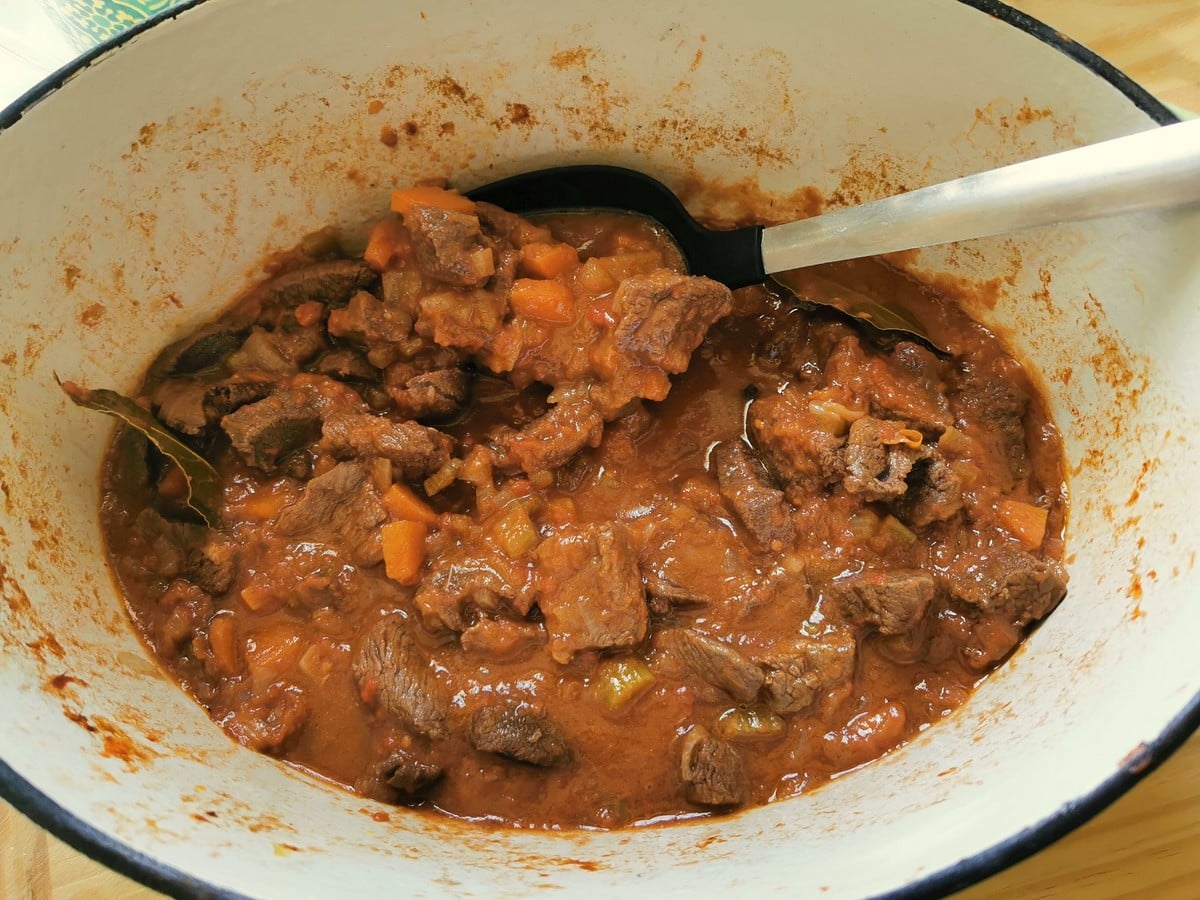

7) If the ragu appears too thick, adjust its consistency with the reserved pasta cooking water.
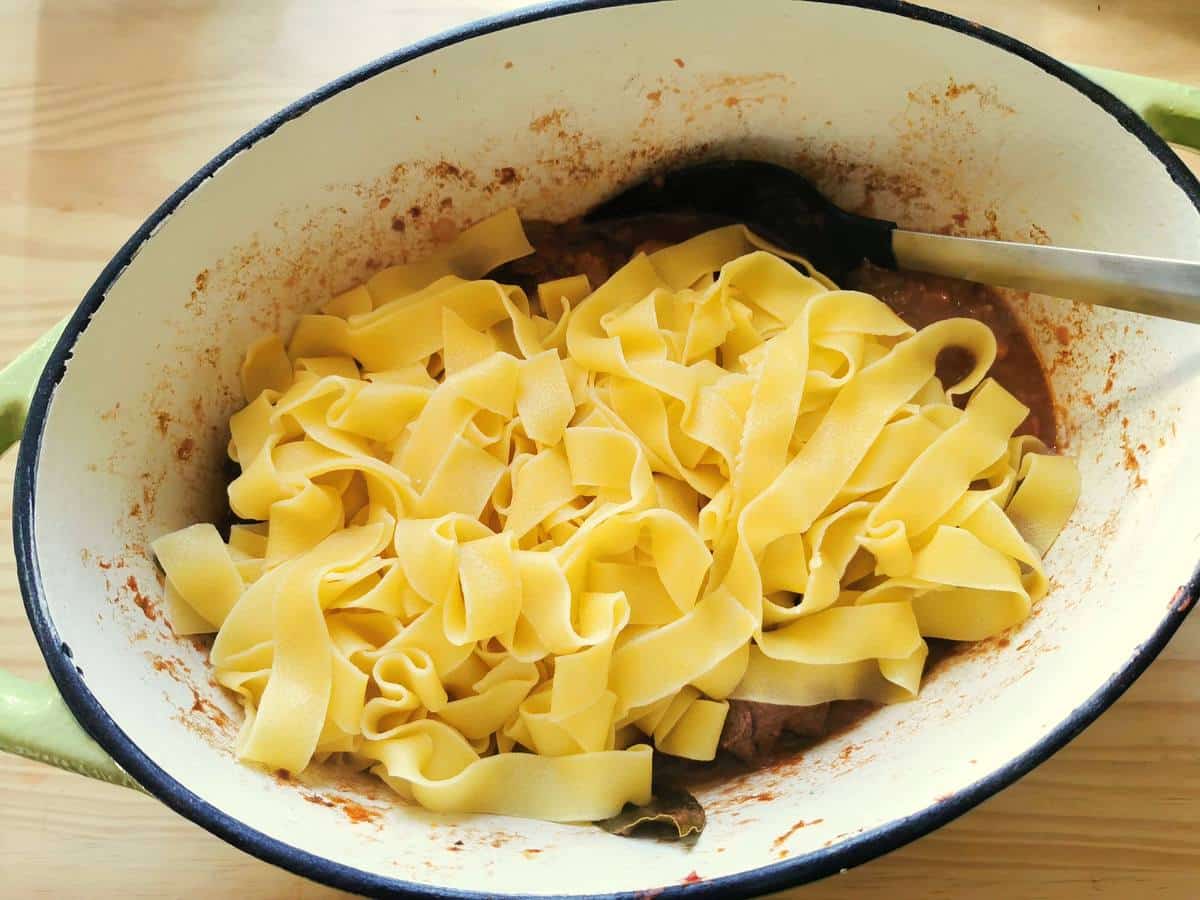

8) Add the drained pasta into the sauce and mix together well, then plate with more ragu on top. Serve immediately.
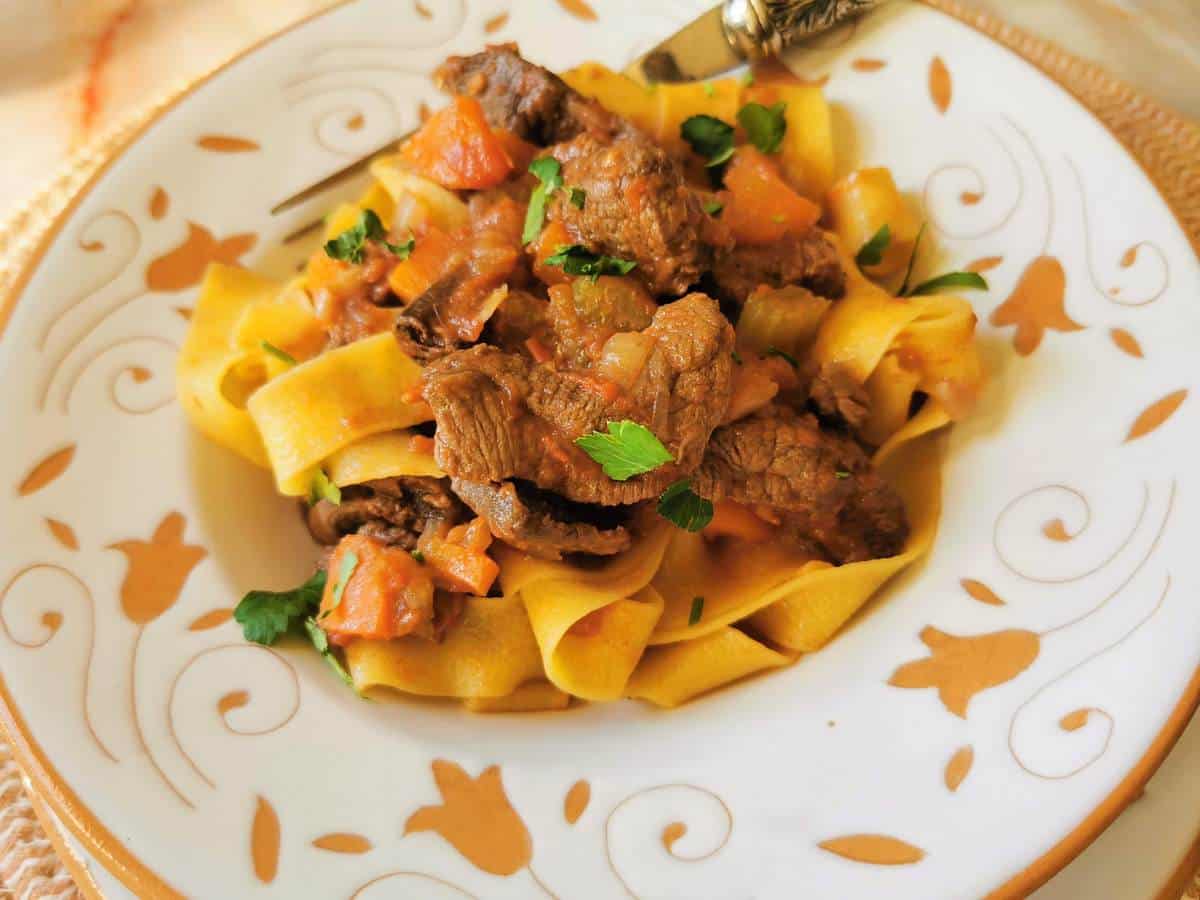

Storage and Leftovers
There are two main ways to store this dish: storing the ragu separately from the pasta or keeping the mixed ragu and pasta together. Storing them separately is often preferred, as it allows you to enjoy freshly cooked pasta with the rich ragu.
When Ragu is Stored Separately from Pasta:
Refrigerating: Store the venison ragu in an airtight container in the refrigerator; it will stay fresh for 3-4 days. The flavors will continue to develop and meld, resulting in an even more flavorful ragu upon reheating.
Freezing: For longer storage, freeze the ragu in freezer-safe containers for up to 3 months.
Reheating: Thaw the ragu in the refrigerator if frozen, then reheat gently on the stove over medium heat. If the sauce has thickened too much, adjust with a little water or broth until you reach the desired consistency. Prepare the pasta fresh to serve with the reheated ragu.
When Ragu is Already Mixed with Pasta:
Refrigerating: If you have leftovers of venison ragu mixed with pasta, place them in an airtight container and refrigerate for up to 3-4 days.
Freezing: You can freeze the pasta and ragu however the pasta will likely be mushy when thawed and reheated.
Reheating: The easiest way is to use the microwave. Place the venison ragu and pasta in a microwave-safe container, then heat in intervals, mixing in between until hot throughout.
FAQs
Marinating the venison helps tenderize the meat and reduce its gamey flavor, enhancing the overall taste of the ragu.
Absolutely. The ragu actually increases in flavor the next day as the flavors have more time to meld. Just store it in the refrigerator and reheat gently before serving with freshly cooked pasta.
Yes, beef is a good substitute for venison in this ragu. You can use a slow-cooking cut like beef chuck, which will become incredibly tender once slow-cooked.
More recipes you may like:
If you do try this venison ragu, I’d love to hear what you think. Please write a comment here on the blog or post a comment on the Pasta Project Facebook page.
Your feedback is important to me!
Buon Appetito!
Pin for Later:
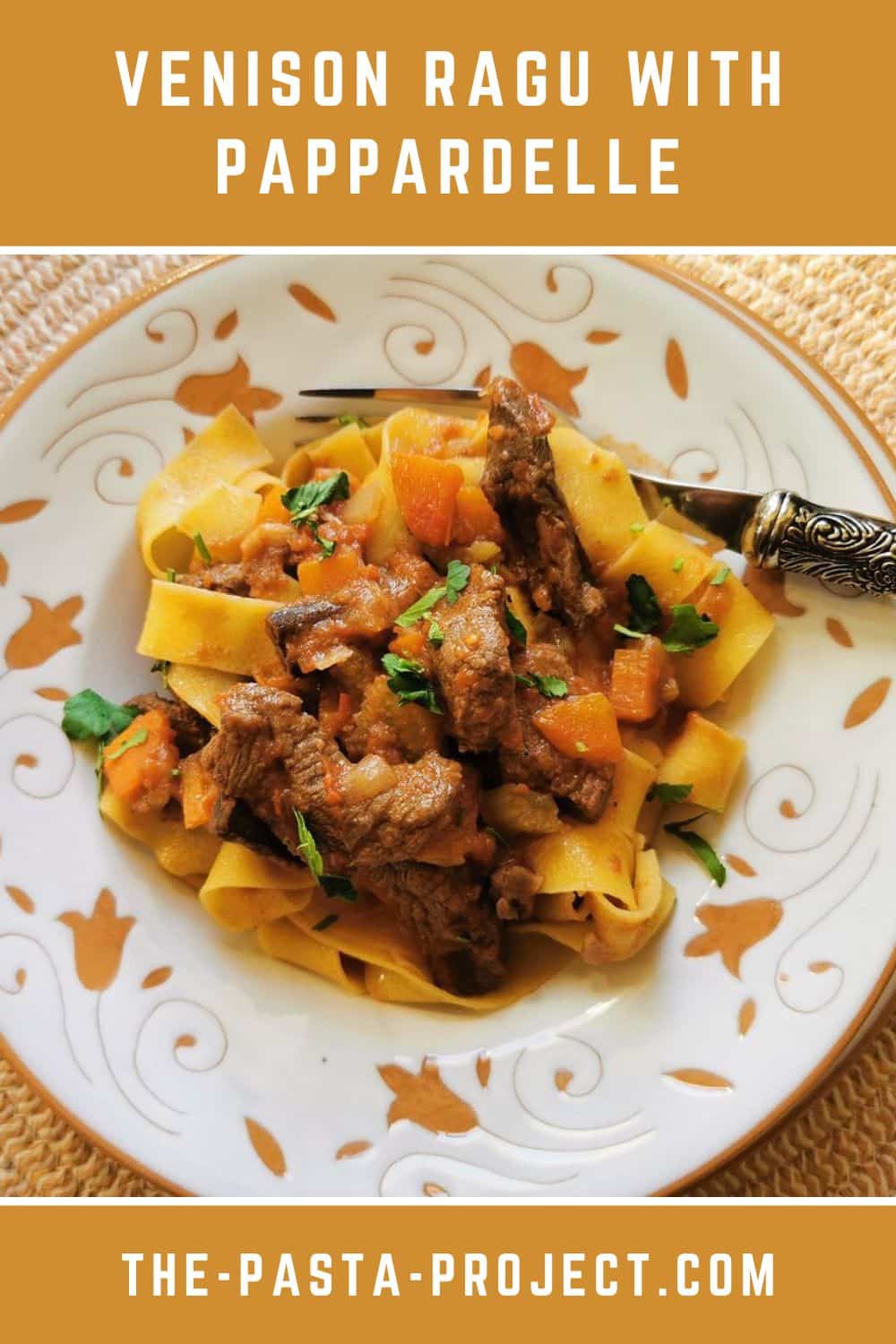

If you are interested in learning how to make homemade pasta and different types of gnocchi, check out my shop page for some great video online courses from my friends in Rome! Nothing beats learning to make pasta from Italians! Plus while you’re there why not order a copy of one of my pasta recipe cookbooks or checkout some recommended pasta making tools?
Reader Interactions
[ad_2]


